-
Bruno dumont: Hadewijch (2009)
BRUNO DUMONT: HADEWIJCH (2009)

JULIE SOKOLOWSKI IS HADEWIJCH (CELINE)-Indiewire
Tha Fatiha and the Lord's Prayer, side by side
Dumont, who has dealt most successfully with brutish country people in Bailleul, the bleak part of northern France he comes from, makes some big changes here. He focuses on a religion-obsessed girl from an upper-class Paris background who gets mixed up with Muslim Arabs from the projects (banlieue), and an ex-con. The focus is on religion and activism, and on love of God carried too far.
As the film begins the 20-year-old Hadewijch (Julie Sokolowski), not yet fully invested as a nun, is asked to leave the convent because she is excessive. She refuses to eat and stands out in the cold and rain without a coat. The sisters find she is confusing abstinence with martyrdom. Her concept of being the "bride of Christ" is also too literal, and is to remain so. She goes back to being Celine and living with her father, a government minister, on the Ile St. Louis, in a palatial residence in the most elegant part of Paris.
But she quickly befriends unemployed, untrained ghetto boy Yassine (Yassine Salime), who tries to pick her up in a local cafe. Yassine, a rather sweet little guy, is a bit of an oddball himself. He steals an expensive motorcycle and races around town with her on the back running red lights because he doesn't like the way the owner of the bike looked at him. She fails to respond to his taste in music, a kind of punk-meets-Satie band by the Seine, and goes by herself to a baroque concert in a church. But Yassine accepts that Celine considers herself the bride of Christ and wants to remain a virgin: they agree to be friends, and after he's dined with her remote, clueless father and mother on the Ile St. Louis and stolen the bike, he takes her to his home on the outskirts to meet his brother, David (Karl Sarafidis), a devout Muslim who does his own backstreet religious teaching.
David invites Celine to a class he gives about the concept of "the invisible" ("al-ghayb") in Islam, but she flees when a strapping young Arab eyes her hungrily in the class. David follows her to discuss this, and they become friends. Eventually David convinces Celine to consider "action" and even the necessity of violence as a focus for her troubled sense that God is not present despite her passion for Christ. She goes with him to visit the West Bank, or somewhere like it, such as Lebanon (where the sequence was shot) where her decision is translated into Arabic and she's welcomed by radicals. Back in Paris, she's present at an explosion.
Later Celine is back at the nunnery, when, in a dreamlike sequence, she flees the police and walks into a stream where she's embraced by the young ex-con.
Dumont works, as anyone who follows such things knows, outside any mainstream of French filmmaking ("self-taught," some say) and is the subject of controversy, despite winning two grand prizes at Cannes and expressing a continuing desire to win a wider audience. This film had its premiere however at Toronto and doesn't open in France till November 25th.
In an essay for Cinema Scope, Scott Foundas says this film is "in part, a continuation of [Bruno Dumont's] career-encompassing study in the origins and varieties of human violence," but we note that there is no cruelty, and no sex, bestial or otherwise. Several writers (such as the skeptical Variety reviewer) have been troubled by the somewhat extraneous way the con (eventually ex-; David Dewaele) is threaded through the film only to appear as a workman at the convent and then in the final faintly redemptive moment.
Another question is why either a young Muslim teacher or what may be "terrorists" in the Middle East would be interested in the passion of a wayward Christian nun, though Elley of Variety considers the discussions between Nassir and Celine the most touching scenes in the film. What one can agree on is that the filming is intense and beautiful and full of Dumont's typically memorable awkwardness, the blue-tinged images heightening Celine/Hadewijch's pallor. Her face has the luminosity of some saint in a medieval panel. As before in Dumont, the non-actors are arresting and convincing, the scenes, odd and sui generis, are fresh and thought-provoking, but this for me was not as gripping or as emotionally intense a film as Dumont's previous Flandres, though there is a new sweetness about it that's welcome, even as it comes with provocative hints that ecstatic Christianity and violent jihad are cousins.
Seen as part of the New York Film Festival at Lincoln Center, 2009. A few weeks earlier, Hadewijch won the FIPRESCI Special Presentation Prize at Toronto, where it was the opening film. It has been picked up by IFC. Also included in the SFIFF and shown May 5 and 6, 2010.
Last edited by Chris Knipp; 09-10-2014 at 09:47 AM.
 Posting Permissions
Posting Permissions
- You may not post new threads
- You may not post replies
- You may not post attachments
- You may not edit your posts
-
Forum Rules





 Reply With Quote
Reply With Quote
Bookmarks